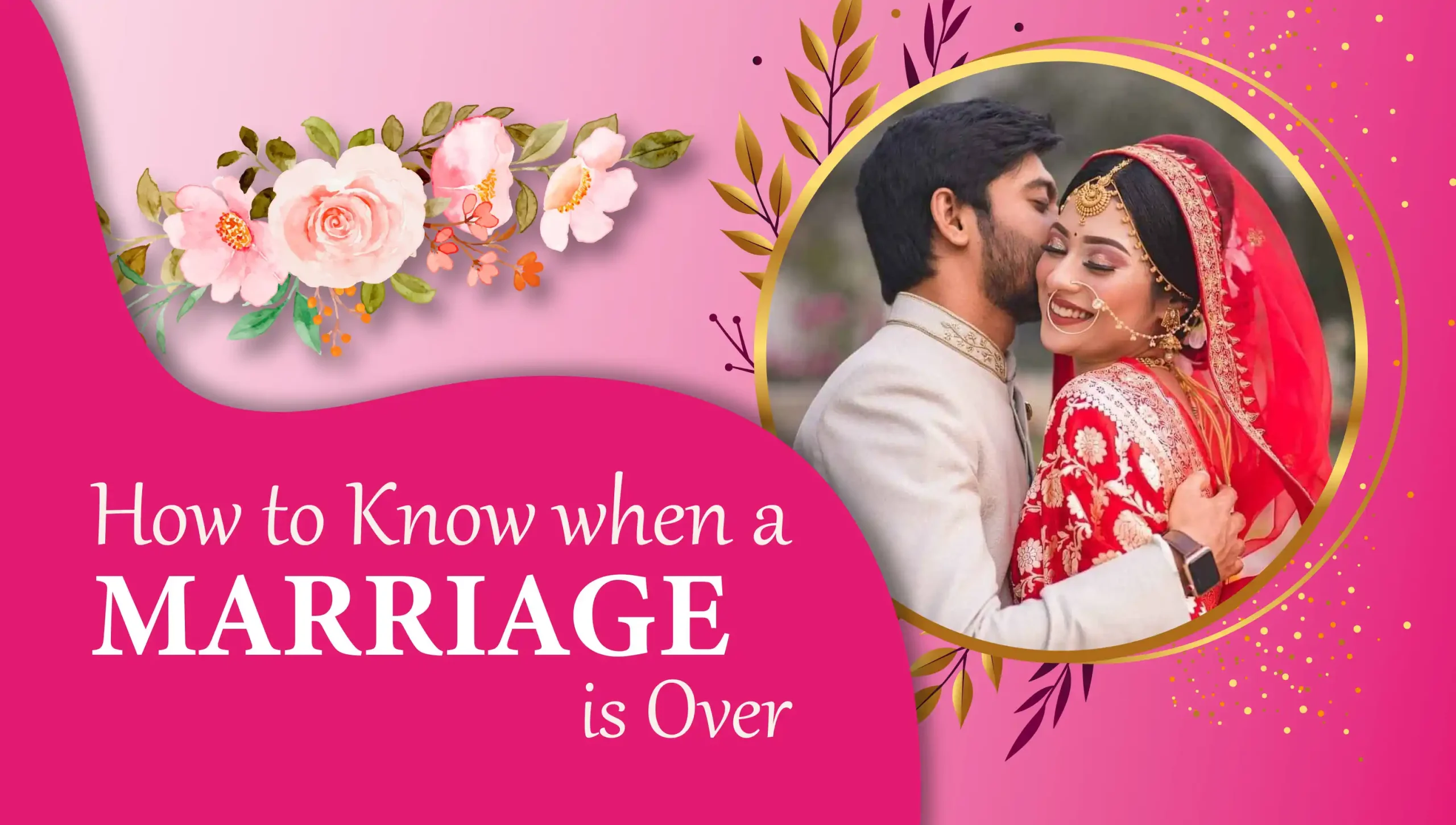How to Know When a Marriage is Over
Marriage is a bond that many of us enter into with the hopes of a lifelong connection filled with love, happiness, and mutual growth. However, life doesn’t always follow the path we expect, and sometimes, the reality is that a marriage can begin to deteriorate. It can be challenging to accept, and often, it’s hard to know exactly when a relationship has run its course. Recognizing that your marriage is over is crucial in taking steps toward healing, whether trying to salvage the relationship or moving forward in a different direction.
As someone who has worked with many couples over the years, I’ve witnessed firsthand how difficult it can be to accept the reality of a relationship reaching its end. Over time, it becomes clear that something is off, but when is it time to assume that your marriage is truly over? Here, I’ll explore the common signs that indicate when your marriage is over and how to know when it’s time to let go.
Understanding the Early Signs Your Marriage is Over
Marriage is a partnership; like any relationship, it takes effort, understanding, and commitment. However, sometimes things change, and one or both partners may begin to feel disconnected, unhappy, or dissatisfied. But how do you know if your marriage is over? Often, the answer comes from noticing a shift in your feelings or behaviour.
1. You Feel Emotionally Detached
One of the most glaring signs that a marriage may be over is emotional detachment. Emotional intimacy is a cornerstone of any successful marriage. Over time, if you begin to feel indifferent or resentful toward your spouse, it may indicate more profound issues. When you stop caring about how they think, what they need, or what’s going on in their lives, it could signal that the emotional connection has been severed.
2. You No Longer Communicate Effectively
Communication is vital for maintaining a healthy relationship. If you can no longer communicate openly, honestly, and respectfully with your spouse, the foundation of your marriage begins to crumble. When arguments turn into silence, or you avoid talking about important issues, it’s a sign that something is wrong. If every conversation feels like a battle, or worse, if you don’t speak, it’s time to consider whether your marriage is over.
3. You’re More Interested in Being Alone Than Together
You usually look forward to spending time together in a relationship. However, it’s a serious red flag when you begin to feel more at peace being alone rather than with your spouse. You may not be interested in sharing experiences with them or actively seeking opportunities to be away from them. This disinterest is one of the most evident signs your marriage is over.
4. There’s No Physical Intimacy
Physical intimacy isn’t just about sex; it’s about connection, affection, and showing love through touch. A lack of physical intimacy can signify that something has shifted in the relationship. If you and your spouse are no longer affectionate, don’t kiss, hug, or hold hands anymore; it’s a sign of emotional disconnection. This lack of touch often correlates with an emotional disconnect, weakening your bond.
5. You Constantly Fight or Argue
Disagreements are standard parts of any relationship. However, when every conversation turns into an argument, it can be draining and emotionally exhausting. Constant fighting doesn’t necessarily mean that the relationship is over, but if the fights are more frequent and intense and never seem to resolve anything, it could be a sign that the marriage has reached its limit. If fighting becomes your primary mode of communication, it’s a major red flag.
6. Your Needs Are No Longer Being Met
Every individual has emotional, physical, and mental needs within a relationship. If you consistently feel unfulfilled in these areas and your spouse is unwilling or unable to meet those needs, it can lead to frustration, disappointment, and disconnection. Relationships require give-and-take; when one partner stops giving, the other feels unsupported. If you’re constantly compromising your needs to avoid conflict, or worse, if your spouse no longer seems interested in your well-being, it might be time to ask yourself whether your marriage truly serves both of you.
7. You Don’t Respect Each Other Anymore
Respect is a fundamental component of any relationship. When that respect erodes, it can cause significant damage to the marriage. If you no longer trust or value your spouse or have started to disrespect them through hurtful words, actions, or neglect, it’s a sign that the relationship is no longer healthy. Without respect, love cannot thrive, and it’s hard to continue in a marriage where you no longer hold each other in high regard.
8. You Fantasize About Your Spouse
Another common sign that a marriage may be over is when you start daydreaming about life without your spouse. You may imagine scenarios where you are happier, more complimentary, or more fulfilled without them. You may even begin planning life if you weren’t married. If these fantasies become a regular occurrence, it’s an indication that you might already be emotionally checked out of the relationship.
9. You Don’t Share Your Life Anymore
In healthy marriages, couples share the highs and lows of their day-to-day lives, from work to personal challenges and accomplishments. If you’re no longer sharing these moments with your spouse and are keeping them to yourself, it could indicate a loss of connection. The emotional distance is widening, and the bond you once had is starting to fray.
10. You’re No Longer Interested in Making Things Work
Sometimes, the realization that age is over comes from within. You may find yourself less motivated to work on the relationship, less interested in resolving conflicts, or unwilling to try to fix things. If you’re not invested in improving the relationship, it could be a sign that you’ve emotionally checked out and are ready to move on.
How to Know If Your Marriage is Over
The question, “How do you know if your marriage is over?” is not one with a simple answer. There is no definitive moment where the switch flips from “still worth saving” to “it’s over.” Instead, it’s a culmination of these signs and emotions building up over time. Some people may find that their marriage has reached a breaking point after years of struggle, while others may only notice these changes in the later stages of the relationship.
Trust Your Instincts
When considering if your marriage is over, it’s essential to trust your gut. If you’ve felt something isn’t right for a while, don’t dismiss it. Our intuition can often provide valuable insights into what is happening beneath the surface.
Seek Outside Help
Before deciding that your marriage is over, consider seeking outside help, such as marriage counselling or therapy. A neutral third party can help both partners gain clarity, uncover deep-rooted issues, and explore whether the marriage is worth saving. However, even after therapy, if you don’t see any improvement or if both partners are unwilling to change, it might be time to recognize that the relationship has run its course.
When Is a Marriage Over?
Ultimately, the question “When is a marriage over?” doesn’t have a one-size-fits-all answer. It depends on the individuals involved, the nature of the relationship, and how much both partners are willing to fight for the marriage. However, if both partners are emotionally and physically checked out, or if they are unable or unwilling to work through their issues, it may be time to consider parting ways.
Conclusion: How to Tell When Your Marriage is Over
Knowing when your marriage is over is never easy. It’s a profoundly emotional process that requires much reflection, honesty, and sometimes pain. If you’ve recognized that your marriage is over, taking a step back, evaluating your feelings, and considering the future is essential. While it may be hard to accept, acknowledging the reality of your situation is often the first step in healing and finding peace.
Whether you decide to work through the challenges with professional help or realize that it’s time to move on, what matters most is your emotional well-being and future health. Relationships evolve, and sometimes, they come to an end. And while that’s incredibly difficult, it also opens the door to new beginnings and personal growth.
If you are in this situation, take the time to make the right decision. Relationships are complicated, but you deserve happiness, peace, and fulfillment—from rebuilding your marriage to starting fresh.
FAQ
What is the 7-7-7 rule for marriage?
The 7-7-7 rule is a relationship guideline suggesting that couples should spend seven hours a week together, have seven dates a year, and take seven days off together annually. This helps maintain a strong connection, build intimacy, and prevent relationship burnout.
How do I know when it’s time to end my marriage?
Knowing when it’s time to end a marriage often comes down to emotional detachment, constant conflict, lack of communication, and a lack of desire to improve. If you feel stuck or disconnected and have tried everything to resolve the issues without success, it might be time to consider ending it.
When to call it quits in a marriage?
You may want to call it quits when emotional and physical intimacy is completely lost, respect has eroded, and both partners are no longer invested in making things work. If you find that you’re constantly unhappy and unfulfilled and nothing improves despite your efforts, it could be time to move on.
How do you know when to let go in a marriage?
Letting go becomes apparent when you feel more disconnected than ever, there’s no effort to change, and you’re continuously unhappy or unfulfilled. Acknowledging your emotions is crucial, and when you realize that it harms your well-being, letting go might be the healthiest option.
What is the 2-2-2 rule in marriage?
The 2-2-2 rule encourages couples to go on a date every two weeks, spend two hours of quality time together weekly, and plan a two-day getaway every six months. This rule helps maintain the romantic and emotional bond in a marriage.
Why is year 7 the hardest in marriage?
Year 7 is often considered the hardest in marriage due to the “seven-year itch,” which can result from the initial excitement of a relationship fading. Couples may struggle with unmet expectations, a lack of novelty, or changes in life goals, leading to dissatisfaction and questioning of the relationship.
What is 777 in a relationship?
The 777 rule in relationships refers to spending seven hours a week together, having seven dates a year, and taking seven days off for a trip annually. The goal is to keep the relationship strong and prevent complacency by prioritizing.
What is the 10-minute rule in a relationship?
The 10-minute rule suggests that couples dedicate at least 10 minutes daily to connect emotionally. This could be through a short conversation, cuddle time, or expressing affection. It helps ensure both partners stay emotionally engaged and supported.


 Address: House: 8/A, Road 14, Dhanmondi, Dhaka-1209
Address: House: 8/A, Road 14, Dhanmondi, Dhaka-1209 Email:
Email: